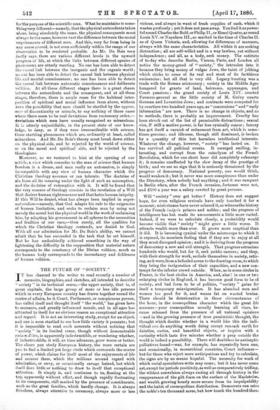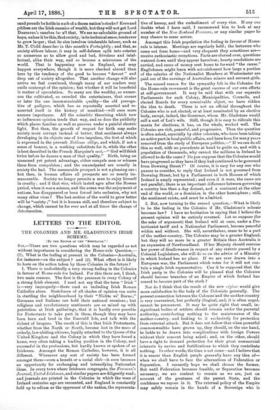THE FUTURE OF "SOCIETY."
IT has chanced to the writer to read recently a number of memoirs, biographies, and sketches, all intended to describe " society " in its technical sense,—the upper society, that is, of great capitals, the large group of more or less idle persons which in every European country has drawn together round the centre of affairs, be it Court, Parliament, or conspicuous person, has called itself and thought itself " the world," has given laws to manners, and greatly influenced morals, and in all ages has attracted to itself for no obvious reason an exceptional attention and regard. It is not an interesting study, except for an object, and one is soon startled to see how little variety it presents ; but it is impossible to read such accounts without noticing that " society " in its limited sense, though without demonstrable raison d'etre, is apparently indestructible, or wondering whether, if indestructible, it will, as time advances, grow worse or better. The closer you study European history, the more certain are you to find a limited yet large circle which surrounds the centre of power, which claims for itself most of the enjoyments of life and secures them, which the millions around regard with admiration, or envy, or occasionally savage hatred, but which itself does little or nothing to draw to itself that exceptional attention. It simply is, and continues to be, floating at the top, apparently without effort, and though rapidly fluctuating in its components, still marked by the presence of constituents, such as the great families, which hardly change. It is always frivolous, always attentive to ceremony, always more or less
vicious, and always in want of fresh supplies of cash, which it wastes profusely ; yet it does not pass away. You find it as power- ful round Charles the Bold, or Philip II., or Henri Quatre, as round Louis XV. or Napoleon III., as marked in the time of Charles II. as of Queen Victoria, and, allowing for differences of manners, always with the same characteristics. All within it are seeking distraction ; all are self-willed and in a way lawless, yet without independence; and all, as a body, seek money. The satirists of to-day who describe Berlin, Vienna, Paris, and London all notice the money-greed of " society," the intrusion into it because they bring money of vulgar Jews, the taint of jobbing which sticks to some of its real and most of its factitious eminencies ; but all that is very old. Legacy-hunting was a trade with the Roman aristocracy ; society in the Middle Ages hungered for grants of land, heiresses, appanages, and Court pensions ; the grand society of Louis XIV. courted Farmers-general as the little society of M. Grevy courts German and Levantine Jews ; and contracts were competed for by courtiers two hundred years ago, as " concessions " and " early information " are now. There is no change in objects, and as to methods, there is probably an improvement. Cruelty has been struck out of the list of permissible distractions ; sexual vice, if still a motive-power, is far less cynically coarse ; luxury has got itself a varnish of refinement from art, which is some- times genuine ; and idleness, though still dominant, is broken by a quantity of thin but harmless intellectual interests. Whatever the change, however, " society " has lasted on. It has survived all political events. It emerged smiling, in- teresting, and corrupt from the cataclysm of the French Revolution, which for one short hour did completely submerge it ; it remains unaffected by the slow decay of the prestige of birth ; and we see no sign that it is seriously threatened by the progress of democracy. National poverty, one would think, would weaken it ; but it never was more conspicuous than under the Directory, when nobody had anything ; and it was rampant in Berlin when, after the French invasion, fortunes were not, and £100 a year was a salary coveted by great persons.
Will " society " ever get better ? History does not suggest hope, for even religions revivals have only touched it for a moment; misfortunes have never sobered it, as witness the history of the French emigres princes and nobles ; and the progress of intelligence has but made its amusements a little more varied. Indeed, if we were to calculate closely, a probability would become visible that society " might grow a little worse. It attracts wealth more than ever. It grows more sceptical than it did. It is becoming cynical under the microscope to which it is exposed, its members feeling that if they are to enjoy at all they must disregard opinion ; and it is deriving from the progress of democracy a new and evil strength. That progress ostracises hundreds who would, but for it, seek public careers ; and they, with their strength for work, seclude themselves in society, retir- ing, as it were, from a befouled arena to the drawing-room, to which they bring the invigoration of their capacities, and a new con- tempt for the inferior crowd outside. When, as in some circles in France, in the best circles in America, and, alas ! in one or two enlarging circles in England, it has become good form to be of society, and bad form to be of politics, " society " gains for itself a temporary reinvigoration. It has absorbed men and women too good for it, and waxes fat on wasted brains. There should be deterioration in those circumstances of the hour, in the cosmopolitan character which the great life assumes—your cosmopolitan usually learning all vices, be- cause released from the pressure of all national opinions —and in the growing pressure of true pessimistic thought, the thought which doubts whether in a world like this the indi- vidual can do anything worth doing except ransack earth for dainties, curios, and beautiful objects, or inquire with a curiosity which lasts five minutes whether a peep outside the world is indeeI a possibility. There will doubtless be antiseptic palliatives found—war, for example, has repeatedly been one, and occasionally, in monarchical countries, Court influence— but for those who reject mere anticipations and try to calculate, the signs are by no means hopeful. The necessity for work of which social speculators write may come ; but it has never come yet, except for periods positively, as well as comparatively trifling, the wildest convulsion always ending all through history in the reappearance of the gilt foam on the surface of the Maelstrom, and wealth growing hourly more secure from its impalpability and the habit of cosmopolitan distribution. Democrats can seize the noble's ten thousand acres, but how touch the hundred thou-
sand pounds be holds in each of a dozen nation's stocks ? Keen and pitiless are the Irish enemies of wealth, but they will not get Lord Dunraven'e ranches for all that. We see no calculable ground of hope, unless it be this, that society, in its technical sense, tends ever to grow larger ; that its size involves intolerable labour, such as Mr. T. Child describes in this month's Fortnightly ; and that, as society abhors labour, it may in self-defence split into coteries so numerous as to allow good and bad, frivolous and intel- lectual, alike their way, and so become a microcosm of the world. That is happening now in England, and may happen everywhere, though it is more checked abroad than here by the tendency of the good to become " devout " and drop out of society altogether. That another change will also arrive we feel convinced, though many of our readers may smile contempt of the opinion ; but whether it will be beneficial is matter of speculation. So many are the wealthy, so numer- ous the cultivated, so crowded the entertainers, that sooner or later the one incommunicable quality—the old preroga- tive of pedigree, which has so repeatedly asserted and re- asserted itself in the history of mankind—will once more assume importance. All the scientific theorising which now so influences opinion tends that way, and so does the publicity which places families as well as persons under a painful electric light. But then, the growth of respcet for birth may make society more corrupt instead of better, that sentiment always developing in its objects one of two impulses, the first of which is expressed in the proverb Noblesse oblige, and which, if not a sense of honour, is a working substitute for it, while the other is best described in the French Marquise's snot,—" God will think twice before he damns a man of that quality." Birth, being an unearned yet potent advantage, either compels men or releases them from compulsion ; and the emancipated are usually in society the bad. The measurable prospect is not a pleasing one ; but then, in human affairs all prospects are so nearly im- measurable. Society no longer permits a man to enjoy himself in cruelty ; and if that vice, which lasted ages after the Roman period, when it was a science, and the arena was the enjoyment of nations, has disappeared or been forced into seclusion, why not many other vices ? The last section of the world to grow better will be "society ;" but it is human still, and therefore subject to .change, which cannot be for ever and at all times the change of deterioration.



































 Previous page
Previous page